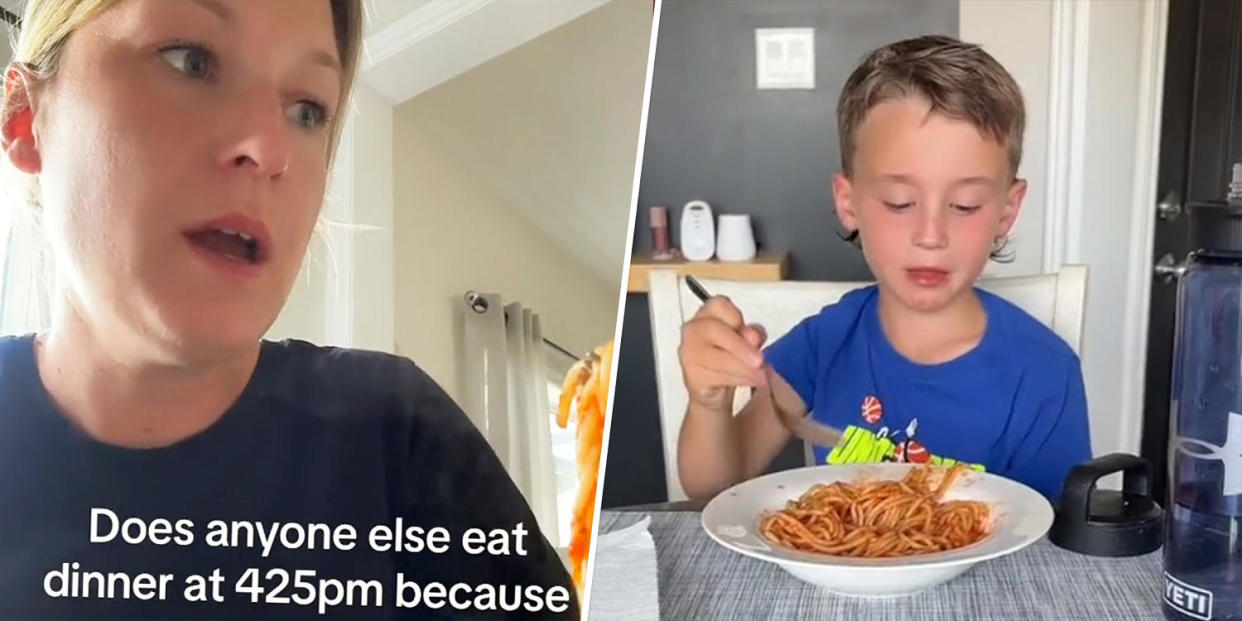Parents share why they are serving dinner as early as 3:45 pm: It's 'life changing'

Parents are ringing the dinner bell early — right after school — claiming it makes for a calmer and happier evening.
“I was tired of giving snacks to my kids who then didn’t eat dinner,” Paige Boyuk, a mother of two who serves dinner at 4:30 p.m. every day, tells TODAY.com.
Boyuk is one of many moms who believe that serving dinner after school — when their kids are hungry and irritable — prevents excessive snacking and tantrums later. Boyuk recently posted a TikTok video of an afternoon dinner of spaghetti and meatballs with her 7-year-old son and 2-year-old daughter.
“Does anyone else eat dinner at 4:25 p.m.because your kids asked for a snack and if they had a snack, they wouldn’t eat dinner so you just serve them dinner?” Boyuk captioned her video with more than 2 million views.
Lots of parents liked Paige’s after-school routine .
“Early dinners are superior.”
“First rule: Eat when hungry.”
“Even with my teens, they are famished after school. Early dinner, then an evening snack.”
“It’s better to eat when you’re hungry rather than when a social clock tells you.”
“We eat dinner early, around 4 p.m. or 4:30 p.m. Then cereal or peanut butter and jelly or something light before bed ... it’s been a game changer in our home.”
“Dinner is served at 4:45 p.m. or as soon as we get home. A snack of fruit and Greek yogurt later in the evening around 7 p.m. and then off to bed!”
Some people said early dinners wouldn’t work in their homes.
“No, because then they ask for more food around dinner.”
“I’m Italian and have a snack at 6 p.m. and dinner at 8 p.m.”
“Nope. I tell them it’s OK to be hungry (and) ‘You had a snack after school ... you can wait until 5 p.m. for dinner.’”
“No, because I work until 5:30 p.m.”
“Snacks before dinner = fruit and vegetables only. So I am not mad if they do not eat very much at dinner.”
Boyuk put her foot down after noticing how much snacking took place after school.
“One day, I said, ‘That’s it. We’re eating the spaghetti at 4:30 p.m,” Boyuk tells TODAY.com. “And we had the best evening — there were no meltdowns and their bellies were full.”
Right after school, Boyuk serves a hearty dinner of chicken and rice, pork loins or pasta. Her kids want a snack before bedtime, which is often sliced apples and cheese.
The routine benefits Boyuk’s family as they enter her son’s hockey season.
“That means we’re living at the rink and my daughter will be tagging along,” she says. Instead of eating arena fare like French fries, says Boyuk, her daughter can snack on a post-dinner assortment of cheese, crackers, and fruit.
Boyuk says one snag in the schedule is that her husband comes home from work when she and the kids are mid-dinner. Although he doesn’t get to enjoy a proper family meal, Boyuk says he’s grateful for a more pleasant evening with his kids.
Mercedes Barnes, a mother of four, serves dinner at 3:45 p.m. every day, which energizes her daughters, ages 10, 7, 4, and 1.
“The (older) girls would come off the school bus starving and grab snacks from the pantry but later, wouldn’t consume their dinner,” Barnes tells TODAY.com. “I started serving dinner at 3 p.m. and they gobbled it down.”
If Barnes’ daughters want a snack several hours later, she serves fruit, vegetables or a granola bar; if they’re very hungry, Barnes reheats a second helping of dinner.
According to Barnes, her daughters no longer experience a blood sugar crash or run around the house “like crazy” after school.
“I see a substantial difference in their behavior — they argue less and fall asleep easier,” she says. “It’s life-changing.”
Early dinners are a great idea for families who can manage it, according to Sarah Williams, a registered dietician in Texas.
“I love the idea of parents leaning into feeding their kids when they’re hungry, rather than the idea that dinner has to be at a specific time,” Williams tells TODAY.com. “In general, food schedules should run concurrent with our daily lives, (especially) if kids are in sports practice during dinner hours.”
Williams adds that eating earlier allows the body to digest food more efficiently which promotes better sleep, rather than eating right before bedtime when the body is at rest. For a pre-bedtime snack, Williams recommends healthy fats (such as peanut butter) and fruit.
This article was originally published on TODAY.com









